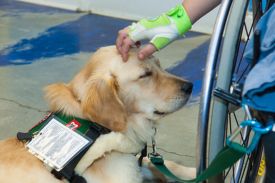Are you looking for a way to impact the lives of those around you positively? Have you heard of therapy dogs and their life-changing effects on people and wondered what they are all about?
Therapy dogs can incredibly affect people’s mental, emotional, and physical health. In this article, we’ll explore the benefits of therapy dogs, share real stories from their humans who have benefitted from them, discuss the science behind these benefits, and provide tips for finding and working with a therapy dog.
So if you want to learn more about how these amazing animals make a difference in people’s lives, read on!
Key Takeaways
- Therapy dogs provide comfort, emotional support, and socialization to people in various settings.
- Therapy dogs undergo rigorous obedience training before certification and are carefully selected and specially trained for empathy and proper behavior.
- Therapy dogs have a powerful impact on people’s mental, emotional, and physical health, improving socializing, emotional support, a sense of purpose, companionship, and opportunities to meet new people.
- Real stories of therapy dogs helping veterans with PTSD and comforting elderly individuals in nursing homes demonstrate the invaluable source of support they provide.
What are Therapy Dogs?

Therapy dogs aren’t just pets – they’re life-changing companions! A therapy dog is a specially trained companion animal that provides comfort, emotional support, and socialization to people in hospitals, nursing homes, schools, and other settings.
There are many types of therapy dogs: some are purebreds, while others are mixed breeds; some have undergone formal training programs, while others have been trained by their families. No matter the breed or background of your pet, you can teach them to become certified as a therapy dog with the proper training and dedication.
When it comes to choosing the right breed for a therapy dog, there are many considerations to take into account. Some species may be better suited than others depending on the environment and type of work you plan to do with your pet. For example, smaller lapdogs might be better suited for hospital visits where space is limited; however, larger breeds may be more suitable for working with children in classrooms or outdoor spaces due to their size and temperament. Additionally, all potential therapy dogs must undergo rigorous obedience training before becoming certified as therapy animals.
The hard work spent on training is worth it when you witness firsthand how much joy these animals can bring to those who need it most – providing comfort during a difficult time or simply allowing someone to spend quality time with an animal friend. No wonder so many individuals have opened their hearts (and homes) to these fantastic four-legged friends!
Benefits of Therapy Dogs

Owning a therapy dog has been proven to improve one’s mental and physical health, with studies showing a decrease in blood pressure for pet owners.
In addition, having a therapy dog can offer many unique benefits that could be life-changing for their humans:
- Increased socializing of both the pet and its human
- Emotional support in times of need or stress
- A sense of purpose to motivate daily activities
- The companionship that brings laughter and joy into the home
- Opportunities to meet new people when visiting hospitals, retirement homes, schools, etc.
The unconditional love and support these animals provide are unlike anything else.
From reducing anxiety to providing comfort in difficult situations, these pups show us how powerful our connection with animals can be.
For those suffering from depression or loneliness, owning a therapy dog can help bring light back into their lives while making coping with life’s challenges more manageable.
Real Stories from People Who Have Benefited from Therapy Dogs
You may be surprised to hear how dramatically the companionship of a therapy dog has positively impacted so many people’s lives. From helping veterans struggling with PTSD cope with their illness to comforting elderly individuals living in nursing homes, therapy dogs can provide an invaluable source of support.
But what does it take for someone to benefit from a therapy dog? Careful consideration is taken when selecting and training therapy dogs. Each animal must undergo rigorous testing before they are qualified for service. At the same time, those handling the animals must also complete extensive training to ensure that both humans and dogs are prepared for the therapeutic relationship that lies ahead.
Those who have benefited from having therapy dogs by their side attest to its life-changing power. From providing emotional support in times of distress to simply being there as a companion through thick and thin, these furry friends genuinely make a difference in their humans’ lives.
The Science Behind the Benefits of Therapy Dogs

Studies have shown that the companionship of a therapy dog can provide numerous benefits, from easing loneliness to reducing stress levels. But how exactly do these furry friends make such a life-changing impact? Let’s examine the science behind why therapy dogs make such a difference in people’s lives.
Therapy dogs are carefully selected and specially trained for their job. They must respond appropriately to stimuli without becoming easily overwhelmed and be comfortable with physical contact with strangers. Therapy dog training focuses on teaching the canine empathy and proper behavior in public settings and around other animals.
The canine empathy developed through therapy dogs’ training helps create an atmosphere of unconditional love and acceptance, allowing humans to relax and open up more quickly when discussing their issues or concerns. This positive reinforcement encourages humans to share more openly, resulting in greater understanding between both species. This creates an environment where meaningful conversations can occur – potentially leading to healing or problem-solving solutions for those involved.
Thanks to this powerful bond between humans and therapy dogs, many people have gained clarity on challenging situations or made changes in their lives that they could not before meeting their four-legged friend. It shows just how powerful of an impact one small creature can have!
Tips for Finding and Working with a Therapy Dog
Finding the right therapy dog to work with can be a rewarding experience. Here are three tips for choosing and training your pup:
- Puppy selection – Look for qualities such as a calm, friendly demeanor, good socialization skills, and the ability to respond positively to commands. Consider whether you want a specific breed or just an all-around lovable pooch.
- Training basics – Start by teaching obedience commands such as sit, stay, come, and down. You may also need to train your pup to behave in specific scenarios they’ll encounter in their therapy sessions.
- Socialize your pup early – Take advantage of early puppyhood by exposing them to different people, places, sights, and sounds. This will help them develop into well-rounded companion animals that can easily handle the demands of being a therapy dog!
By selecting and adequately training your furry friend before starting their journey as a therapy dog, you’re setting yourself up for success in helping others heal through animal-assisted therapies!
Frequently Asked Questions
How much does it cost to get a therapy dog?
A therapy dog’s emotional and health benefits come at a cost – but it’s worth every penny. Think of it as an investment in yourself, like planting a seed that will grow into something beautiful. Enjoy the journey and reap the rewards!
Are there restrictions on who can have a therapy dog?
Do you qualify for a therapy dog? Volunteering opportunities are available to anyone with an emotional need, so don’t hesitate to explore your options! You can be part of this life-changing experience with the right attitude and passion.
Who can provide training for a therapy dog?
You can get financial aid and emotional support to help train a therapy dog. Let’s work together to make a difference, providing healing and comfort to those in need.
What are the requirements for a therapy dog to be certified?
You must ensure your therapy dog meets the service requirements and passes health tests. Serve others by providing your pup has what it takes to be certified!
Are there any legal considerations to owning a therapy dog?
Investigate animal rights and emotional support: are there legal considerations to owning a therapy dog? Absolutely! Be sure to research your local laws on pet ownership and any additional requirements for certification.
Conclusion
In conclusion, “The Life-Changing Impact Of Therapy Dogs” unveils the incredible power that these four-legged heroes possess in transforming lives. At Bone Voyage Dog Rescue, we witness firsthand the profound effects therapy dogs have on individuals facing physical, emotional, or mental challenges. These remarkable canines exude unconditional love, empathy, and an innate ability to heal wounded souls.
Throughout this blog, we’ve explored heartwarming stories of therapy dogs bringing joy, comfort, and companionship to those in need. From hospitals to schools, nursing homes to disaster-stricken areas, therapy dogs are beacons of hope, lighting the darkest days.
But our work doesn’t end here. We invite you to join this life-changing journey by considering adoption from Bone Voyage Dog Rescue. Providing a loving home to a rescue dog saves a precious life and opens doors to a future filled with unwavering loyalty and endless affection. Together, we can make a difference.
Take the first step towards experiencing the transformative power of a therapy dog. Visit our website today, explore our diverse range of adoptable dogs, and embark on a lifelong bond that will undoubtedly bring immeasurable joy and love into your life. Join us at Bone Voyage Dog Rescue, and let the adventure begin!
